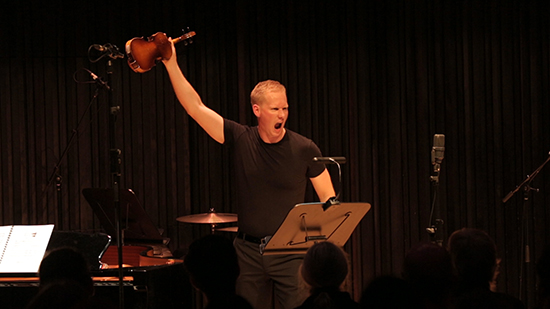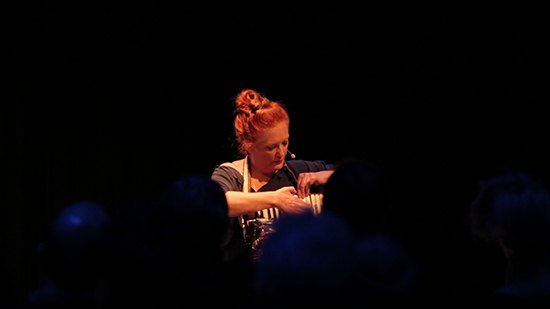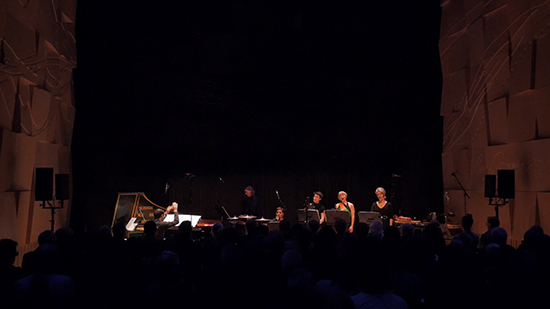Resonant Bodies: voices matter
Zoe Barker

Matthew Thomas, Resonant Bodies
still from video footage by Agatha Yim
Matthew Thomas, Resonant Bodies
The Resonant Bodies Festival has run annually as a three-day event in New York since its inception in 2013. Founded and directed by vocalist Lucy Dhegrae, who travelled to Australia for this first international edition, the festival “curates around people” rather than works. As explained by Dhegrae during the course of the concert, this gives vocal performers freedom to choose or develop pieces that “matter” and encourages them to take risks. Australian sopranos Jane Sheldon and Jessica Aszodi curated the scaled-down version of the festival and, adhering to Dhegrae’s ethos, the result was a sizeable and varied program, capturing the spirit of a festival in one evening.
The world premiere of Elliott Gyger’s A Church Made of Glass opened the concert. With imagery of the glass church in Peter Carey’s 1988 novel Oscar and Lucinda, this concise work contemplated both beauty and madness. In line with the overarching ‘old and new’ theme of this year’s pared-back Metropolis New Music Festival, Gyger’s 11-minute composition was a kind of deconstructed and distilled cantata. Recognisable textures, such as chorale, fugue and recitative, were artfully condensed into the nine short fragments which made up the work. Each of the three vocalists brought a unique quality to the performance. Particularly striking were Aszodi’s power in the low registers, Sheldon’s agility and Dhegrae’s narrative ability. When required though, a fine blend and balance was achieved—with clarinettist Aviva Endean sometimes providing a fourth ‘voice.’
The two central works in the first half complemented each other, both playing with ideas of semantics and meaning. American composer Jason Eckardt’s Dithyramb, performed here by Sheldon, is an outburst of nonsensical vocal sounds inspired in part by an ancient Greek hymn. More, a new work by Natasha Anderson receiving its world premiere by Aszodi, used more substantial textual material for a fairly similar musical effect. Anderson has taken text from medieval music, personal accounts of abuse and recollections of a woman who underwent exorcism. These sources were chosen to foreground ideas of the feminine and violence and, in turn, the shortcomings of language to communicate these experiences. The disordered layering made for thrillingly uncomfortable listening, with the performer required to draw on a range of vocal techniques and emotions. Aszodi was masterful in the way she dealt with the competing ‘voices,’ especially in sections with splits between sung and whispered text—truly giving the impression of multiple performers.

Carolyn Connors, Resonant Bodies
still from video footage by Agatha Yim
Carolyn Connors, Resonant Bodies
Considering Peter Maxwell Davies’ Eight Songs for a Mad King is nearing its 50th anniversary, it’s remarkable that its theatricality can still shock. The intimate space of the Melbourne Recital Centre Salon perhaps enhanced the confronting aspects of the work, given the audience’s proximity to Matthew Thomas’s wailing, snarling, violin-breaking King. Thomas put on a commanding display, acting the part but rarely overdoing it. His performance induced a great deal of empathy, not an easy feat considering the musically exaggerated depiction of madness. The dark humour of Davies’ parodic musical score was captured by the ensemble, providing fleeting relief from the visceral intensity of Thomas’s portrayal. Jack Symond’s thumping rendition of familiar strains from Handel drew muted chuckles, as did the bird-like duet featuring flautist Eric Lamb.
While the first half of the event focused on works that sat firmly within the sphere of contemporary composition, the audience was presented with two longer works in the second half akin to performance art. After the emotionally loaded brevity of each work in the first half, these final compositions perhaps had less impact in their drawing out and ruminating on just a handful of ideas.
Melbourne experimental music stalwart Carolyn Connors opened the half with a new work, Suite for Voice and Keyboard, typical of many of her solo performances. Using an accordion and a bass drum to accompany her vocal explorations, the work was broken into sections by a recurring drone motive—achieved by pressing seemingly random keys on the accordion on her lap and bouncing it on her knees to create miniscule compressions. These slowly unfolding instrumental bridging sections had a trance-like effect, broken by the various vocalisations that made up the Suite.
Odeya Nini’s A Solo Voice is an ongoing work, in which Nini explores the relationship between voice, body and mind. The section presented at Resonant Bodies, New Found Land, mused on Nini’s new experience of motherhood. In broad terms, the work can be considered in two sections: the first using only the voice and movement, and the second adding pre-recorded tape. A particularly effective part of the first section was a burlesque expression of sensuality and pleasure. It was disarming to see a woman gyrating alone on the stage, with no musical backing apart from her own voice, toeing a line between empowerment and vulnerability. But other parts of the work’s structure weren’t as gripping, and perhaps too much time was spent developing short riffs and repetitive breathing patterns. The entrance of the tape track in the darkened room provided a warm and comforting resonance. Nini fitted her live voice within the manipulated instrumental layers to create enjoyable moments.
The first Melbourne edition of the Resonant Bodies Festival was an exciting, thought-provoking and diversely programmed concert. Dhegrae, along with Sheldon and Aszodi, must be commended for their artistic vision—providing a rare space for performers to collaborate and take risks with new vocal music.

Resonant Bodies
still from video footage by Agatha Yim
Resonant Bodies
Metropolis New Music Festival: Resonant Bodies Festival, artists Lucy Dhegrae, Jessica Aszodi, Jane Sheldon, Matthew Thomas, Carolyn Connors, Odeya Nini; Melbourne Recital Centre, 5 May
RealTime issue #138 April-May 2017 pg.






